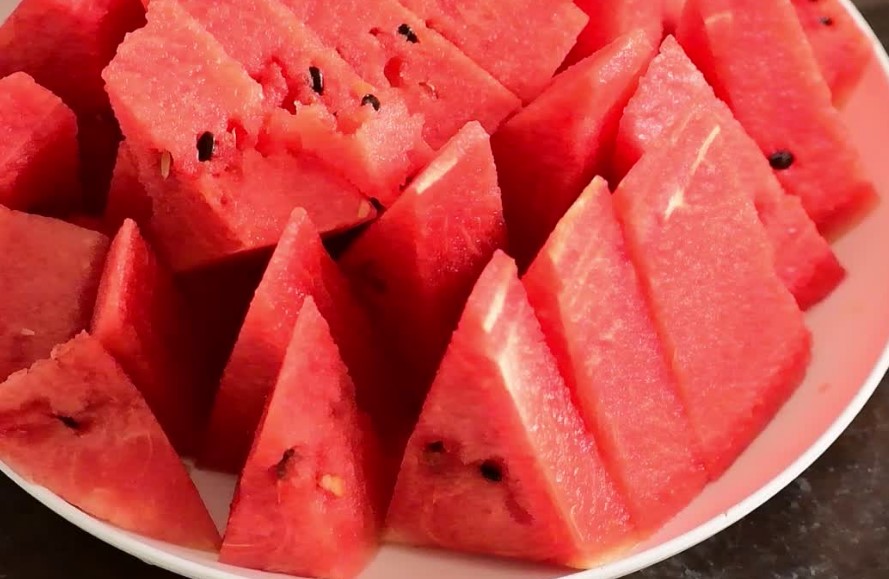Eating watermelon during pregnancy can offer numerous health benefits ranging from hydration to easing digestive issues like heartburn.
One of the standout perks is its ability to reduce swelling, a common discomfort during pregnancy.
By incorporating this juicy fruit into their diet, pregnant women can also enjoy a variety of vitamins and antioxidants that support both maternal and fetal health.
Additionally, watermelon can help prevent edema, providing relief to swollen feet and hands.
Hydration is crucial during pregnancy, and watermelon plays a significant role in maintaining optimal fluid levels.
With its high water content and low-calorie advantage, this fruit can contribute to overall well-being and potentially minimize complications.
1. Gives You Essential Nutrients
Vitamins Supporting Fetal Development
- Vitamin A: Crucial for the development of the baby’s organs, including the heart, lungs, and kidneys according to USDA.
- Vitamin C: Aids in iron absorption and boosts the immune system.
Minerals Supporting Maternal Health
- Potassium: Helps manage blood pressure levels and reduces the risk of hypertension.
- Magnesium: Aids in muscle relaxation and can help prevent premature contractions.
Antioxidants and Beneficial Plant Compounds
- Lycopene: A powerful antioxidant that protects cells from damage and supports skin health.
- Citrulline: Improves blood flow and reduces muscle soreness.
Nutritional Information per 100g of Watermelon
| Nutrient | Amount |
|---|---|
| Calories | 30 kcal |
| Water | 91% |
| Vitamin A | 569 IU |
| Vitamin C | 8.1 mg |
| Potassium | 112 mg |
| Magnesium | 10 mg |
| Lycopene | 4,532 µg |
2. Preventing Dehydration

Proper hydration is crucial during pregnancy to support both mother and baby.
Watermelon, containing approximately 92% water, makes an excellent hydrating choice for expectant mothers.
Eating watermelon helps maintain adequate fluid levels, which is essential for tasks like forming amniotic fluid, supporting increased blood volume, and flushing out toxins.
Water content per 100g of watermelon:
- Water: 91.4g
With its high water content, watermelon also assists in managing body temperature and preventing overheating, a common concern during pregnancy.
Consuming watermelon can also help improve digestion by softening stools, which may alleviate constipation often experienced during pregnancy.
3. Easing Morning Sickness
Morning sickness often affects pregnant women, especially in the first trimester. Watermelon’s high water content helps keep the body hydrated, which can alleviate nausea. It also contains vitamin B6, linked to reduced nausea symptoms.
- Morning Consumption: Eating watermelon in the morning, when nausea is typically most severe, may provide relief.
- Gentle Flavor: Its mild taste makes it easier to consume compared to foods that might worsen nausea.
- Frequent Small Servings: Consuming small pieces throughout the day can offer consistent comfort.
4. Reducing Heartburn

Heartburn is another common issue during pregnancy. Watermelon’s natural properties may help alleviate discomfort by neutralizing stomach acids due to its high water content.
- Soothing Effect: It can help soothe the esophagus and stomach lining.
- After Meals: Eating watermelon after meals or when symptoms occur might help manage acidity according to Mayo Clinic.
- Balanced pH Levels: Incorporating watermelon into the daily diet may assist in maintaining a balanced stomach pH.
5. Amino Acids for Fetal Growth
Watermelon contains important amino acids such as arginine and citrulline, which are vital for fetal development:
- Arginine: Supports protein synthesis essential for developing tissues and organs. It also plays a role in the urea cycle, helping to remove ammonia from the body and maintaining a healthy pregnancy environment.
- Citrulline: Converts into arginine in the body, enhancing its availability and benefits.
NCBI study shows that Including watermelon in the diet can complement other protein sources, ensuring the developing fetus receives adequate amino acids for robust growth. This may lead to healthier birth outcomes and potentially reduce the risk of low birth weight.
6. Lycopene for Healthy Development

Watermelon is rich in lycopene, a powerful antioxidant with anti-inflammatory properties beneficial for pregnant women:
- Reduces Risk of Complications: May help lower the risk of pregnancy complications like preeclampsia.
- Supports Fetal Health: Aids in cellular growth and helps prevent oxidative stress.
- Maintains Amniotic Fluid Levels: Contributes to adequate amniotic fluid levels, critical for fetal development.
Study shows that Incorporating lycopene-rich foods like watermelon into a pregnancy diet can enhance both maternal and fetal health, fostering better developmental outcomes and potentially easing delivery complications.
7. Immune Support for Mother and Child
Watermelon is rich in vitamin C, which strengthens the immune system of both the mother and developing baby, helping to prevent common infections.
- Lycopene, an antioxidant found in watermelon, enhances immune protection by combating oxidative stress—a benefit during pregnancy.
- Beta-carotene and other carotenoids in watermelon support maternal health by reinforcing the body’s defense mechanisms, collectively maintaining a robust immune system.
The fruit’s high water content aids in hydration, crucial for healthy mucous membranes that are essential for immune defense.
Watermelon also provides folate, contributing to DNA synthesis and repair, important for fetal development and the mother’s overall health.
Including watermelon in the diet may reduce the risk of prenatal complications related to immune health, such as infections and inflammation. Hydration and antioxidants like vitamin C and lycopene from watermelon can help mitigate inflammatory responses and boost both maternal and fetal immune systems.
8. Skin Health During Pregnancy

Watermelon can play a beneficial role in maintaining skin health during pregnancy due to its rich nutrient content and hydrating properties. According to the U.S. Department of Agriculture, watermelon is about 92% water, which helps keep the skin hydrated and supports overall skin elasticity.
Hydration and Skin Elasticity
Staying well-hydrated is essential for pregnant women, as dehydration can lead to dry skin and reduced elasticity. The high water content in watermelon aids in maintaining optimal hydration levels, which can help prevent common skin issues during pregnancy such as dryness and stretch marks.
Vitamin C and Collagen Production
Watermelon is a good source of vitamin C, providing approximately 12.5 milligrams per cup. As noted by the National Institutes of Health, vitamin C is crucial for the synthesis of collagen, a protein that maintains skin firmness and elasticity. Adequate collagen production can help the skin adapt to the stretching that occurs during pregnancy.
Antioxidants Protecting Skin
The fruit is also rich in antioxidants like lycopene and beta-carotene. According to a study published by NIH, lycopene has been shown to protect the skin against oxidative stress and may reduce skin damage caused by ultraviolet (UV) rays. Beta-carotene, which the body converts into vitamin A, supports skin cell growth and repair.

